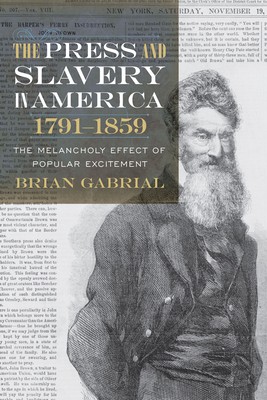
- We will send in 10–14 business days.
- Author: Brian Gabrial
- Publisher: University of South Carolina Press
- ISBN-10: 1611176034
- ISBN-13: 9781611176032
- Format: 15.2 x 22.9 x 1.9 cm, kieti viršeliai
- Language: English
- SAVE -10% with code: EXTRA
Reviews
Description
An examination of how press coverage of slave revolts forced public discussions that ultimately influenced public opinion
Slavery remains one of the United States' most troubling failings and its complexities have shaped American ideas about race, economics, politics, and the press since the first days of settlement. Brian Gabrial's The Press and Slavery in America, 1791-1859 examines those intersections at times when the nation and the institution of slavery were most stressed, namely when slavesrevolted or conspired to revolt. Such events frightened white, slave-owning society to its core and forced public discussions about slavery at times when supporters of the peculiar institution preferred them to be silent. Gabrial closely reads the mainstream press during the antebellum years, identifying shifts in public opinion about slavery and changes in popular constructions of slaves and other black Americans, a group voiceless and nearly invisible in the nation's major newspapers. He reveals how political intransigence rooted in racism and economics set the country on a perilous trajectory toward rebellion and self-destruction.
This volume examines news accounts of five major slave rebellions or conspiracies: Gabriel Prosser's 1800 Virginia slave conspiracy; the 1811 Louisiana slave revolt; Denmark Vesey's 1822 slave conspiracy in Charleston, South Carolina; Nat Turner's 1831 Southampton County, Virginia, slave revolt; and John Brown's 1859 Harper's Ferry raid. Gabrial situates these stories within a historical and contextual framework that juxtaposes the transformation of the press into a powerful mass media with the growing politicaldivide over slavery, illustrating how two American cultures, both asserting claims to founding America, devolved into enemies over slavery.
What the nineteenth century press reveals in this book are discourses--ways of thinking and expression--that have retained resonance in contemporary race relations and American politics. They connect to ideas about the press and technology, changing journalistic practice, and, importantly, the destruction wrought by the dysfunction of the nation's political parties.
EXTRA 10 % discount with code: EXTRA
The promotion ends in 23d.19:20:46
The discount code is valid when purchasing from 10 €. Discounts do not stack.
- Author: Brian Gabrial
- Publisher: University of South Carolina Press
- ISBN-10: 1611176034
- ISBN-13: 9781611176032
- Format: 15.2 x 22.9 x 1.9 cm, kieti viršeliai
- Language: English English
An examination of how press coverage of slave revolts forced public discussions that ultimately influenced public opinion
Slavery remains one of the United States' most troubling failings and its complexities have shaped American ideas about race, economics, politics, and the press since the first days of settlement. Brian Gabrial's The Press and Slavery in America, 1791-1859 examines those intersections at times when the nation and the institution of slavery were most stressed, namely when slavesrevolted or conspired to revolt. Such events frightened white, slave-owning society to its core and forced public discussions about slavery at times when supporters of the peculiar institution preferred them to be silent. Gabrial closely reads the mainstream press during the antebellum years, identifying shifts in public opinion about slavery and changes in popular constructions of slaves and other black Americans, a group voiceless and nearly invisible in the nation's major newspapers. He reveals how political intransigence rooted in racism and economics set the country on a perilous trajectory toward rebellion and self-destruction.
This volume examines news accounts of five major slave rebellions or conspiracies: Gabriel Prosser's 1800 Virginia slave conspiracy; the 1811 Louisiana slave revolt; Denmark Vesey's 1822 slave conspiracy in Charleston, South Carolina; Nat Turner's 1831 Southampton County, Virginia, slave revolt; and John Brown's 1859 Harper's Ferry raid. Gabrial situates these stories within a historical and contextual framework that juxtaposes the transformation of the press into a powerful mass media with the growing politicaldivide over slavery, illustrating how two American cultures, both asserting claims to founding America, devolved into enemies over slavery.
What the nineteenth century press reveals in this book are discourses--ways of thinking and expression--that have retained resonance in contemporary race relations and American politics. They connect to ideas about the press and technology, changing journalistic practice, and, importantly, the destruction wrought by the dysfunction of the nation's political parties.


Reviews